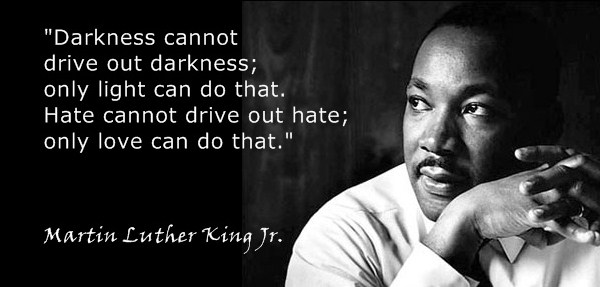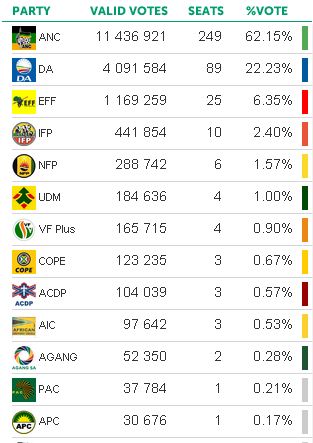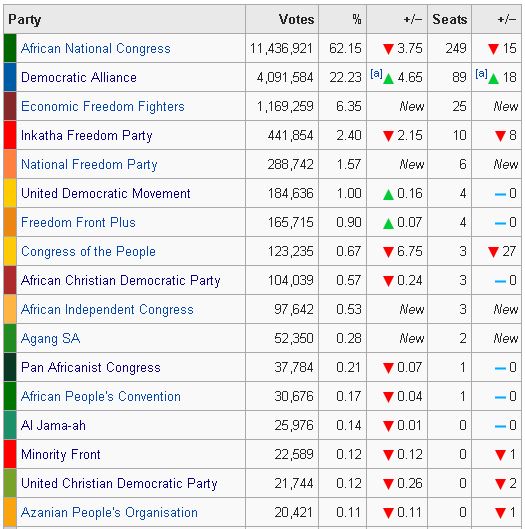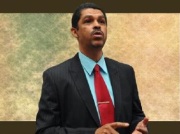
Today, 50 years ago, Martin Luther King Jr. gave his iconic “I have a dream” speech. Now while King is not necessarily so well known in South Africa, he still stands out as one of the most celebrated political leaders in the past century. I will gladly pay homage to King today by writing a bit about what he did, and more importantly – how.
According to me, King was one of the greatest leaders the world has ever seen, and he might be in my top three civil rights leaders, along with William Wilberforce and Abraham Lincoln. The manner in which King tackled his challenges, and handled his adversaries, is worthy of boundless praise.
Martin Luther King never initiated violent protests or riots, in fact he strongly condemned violence. He rather caused revolution through peaceful protests, shaming the oppressors. Now I know many people will want to hang me for saying this, but in my opinion, the South African struggle heroes fade in comparison to Martin Luther King and what he accomplished. He was a true hero in every sense of the word. He was never seen as a terrorist and never resorted to violence or intimidation – but yet he was successful in what he attempted.
Rather than focussing on King and who he was, I would like to focus on some of the specific “peaceful protests” organized by him, as I believe that in this, we as South Africans have much to learn. I did not write the following text, but got it from an article in the Christian Science Monitor:
1. Montgomery bus boycott, 1955-56
Lasting just over a year, the Montgomery bus boycott was a protest campaign against racial segregation on the public transit system in Montgomery, Ala. The protest began, on Dec. 1, 1955, after African-American Rosa Parks was arrested for refusing to give up her seat on a bus to a white person. The next day, Dr. Kingproposed a citywide boycott of public transportation at a church meeting.
The boycott proved to be effective, causing the transit system to run a huge deficit. After all, Montgomery’s black residents not only were the principal boycotters, but also the bulk of the transit system’s paying customers. The situation became so tense that members of the White Citizens’ Council, a group that opposed racial integration, firebombed King’s house.
In June 1956, a federal court found that the laws in Alabama and Montgomery requiring segregated buses were unconstitutional. However, an appeal kept segregation intact until Dec. 20, 1956, when the US Supreme Courtupheld the district court’s ruling. The boycott’s official end signaled one of the civil rights movement’s first victories and made King one of its central figures.
2. The Albany movement, 1961
The Albany movement was a coalition formed in November 1961 in Albany, Ga., to protest city segregation policies. Dr. King joined in December, planning only to counsel the protesters for one day. Instead, he was jailed during a mass arrest of peaceful demonstrators, and he declined bail until the city changed its segregation policies.
The city made several concessions, and King left jail and then Albany. But he returned the next year to find that little had actually changed. Upon his return, he was convicted of leading the prior year’s protest and sentenced to 45 days in jail or a $178 fine. He chose jail. Three days into King’s sentence, an Albany police chief arranged for his release. The movement eventually dissolved, with few substantial results after nearly a year of continued peaceful protests, but the campaign tested tactics that would shape future protests in the national civil rights movement.
3. The Birmingham campaign, 1963
Lasting about two months in 1963, the Birmingham campaign was a strategic effort started by Dr. King’s Southern Christian Leadership Conference to end discriminatory economic policies in the Alabama city. Some of the protests included boycotting certain businesses that hired only white people or that had segregated restrooms.
When businesses refused to change their policies, protesters held sit-ins and marches, with the aim of getting arrested. King encouraged these nonviolent tactics so that the city’s jails would overflow. Police used high-pressure water hoses and dogs to control protesters, some of whom were children. By the end of the campaign, many segregation signs at Birmingham businesses came down, and public places became more open to all races.
Of the tactic used in the Birmingham campaign, King said, “The purpose of … direct action is to create a situation so crisis-packed that it will inevitably open the door to negotiation.”
4. March on Washington for Jobs and Freedom, 1963
Perhaps Dr. King’s most famous act as a civil rights leader came during the March on Washington for Jobs and Freedom, on Aug. 28, 1963. The largest political rally ever seen in the US, it drew between 200,000 and 300,000 police and participants, to whom King delivered his famous “I Have a Dream” speech on the steps of the Lincoln Memorial.
Among other things, the speech advocated racial harmony and economic rights for African-Americans. Observers estimated that nearly 80 percent of the marchers were black.
5. Bloody Sunday, 1965
Dr. King and several other civil rights leaders organized three marches from Selma, Ala., to the state capital of Montgomery, in a bid for voting rights for all.
The first, on Sunday, March 7, 1965, involved nearly 600 protesters who marched east from Selma on US Highway 80, led by Jon Lewis of the Student Nonviolent Coordinating Committee and the Rev. Hosea Williams of the Southern Christian Leadership Conference. King was not present because he had church duties. But days before, King had met with government officials to try to ensure the marchers would not be impeded. Even so, mob and police violence caused the march to be aborted on that “bloody Sunday.” When film footage of the police brutality was broadcast around the country, it sparked widespread public outrage and helped to boost support for the civil rights movement.
Of the event, King later wrote, “If I had any idea that the state troopers would use the kind of brutality they did, I would have felt compelled to give up my church duties altogether to lead the line.”
King tried to organize another march, but protesters did not succeed in getting to Montgomery until March 25. The speech he delivered that day, on the steps of the state capitol, has since become known as “How Long, Not Long.”
Bloody Sunday was a turning point for the civil rights movement, building public support and clearly demonstrating King’s strategy of nonviolence.
6. Chicago, 1966
After successful demonstrations in the South, Dr. King and other civil rights leaders sought to spread the movement north. They chose Chicago as their next destination to take on black urban problems, especially segregation.
To show his commitment to the northern campaign, King rented an apartment in the slums of North Lawndale on the city’s West Side. One Friday afternoon in August, King led about 700 people on a march in Marquette Park on Chicago’s Southwest Side, a white enclave, to protest housing segregation. Thousands of white people gathered, taunting King and the other protesters. At one point, a brick hit King in the head, but he continued the march as onlookers hurled rocks, bottles, and firecrackers at the marchers. Thirty people, including King, were injured.
Of the Chicago protest, King later said, “I have seen many demonstrations in the South, but I have never seen anything so hostile and hateful as I’ve seen here today.” He continued, “I have to do this – to expose myself – to bring this hate into the open.”
———-
I would like to conclude by giving my own little spin on the Martin Luther King speech:
I have a dream, I have a vision.
A dream of a South Africa where the color of your skin does not determine the opportunities you receive.
A dream of a country where all men are treated equal in every sense of the word.
I have a vision of a South Africa where black and white children can play together in the streets,
without fear of abduction or rape.
I have a dream of a country where the most vulnerable and innocent are the most protected,
where a baby will be safe in the womb of it’s mother.
I have a dream of a corruption-free government.
I have a vision of a country where foreign nationals are safe, and can work their way to legal citizenship.
I have a dream of equality, where there is no discrimination against the rich, or the poor.
I have a vision of restored pride in being South African.
I have a dream of a country where people obey the law, fear God, and honor their leaders.
I have a dream.
– – – Nico Smit
-33.925840
18.423220





 Malawi is one of the
Malawi is one of the  So what about the worker? Is it right to assume that they will rather die of hunger than work for what the employer is willing to pay? Are you in their shoes? It is very important to note at this stage, that the people who are protesting for higher minimum wage, are employed themselves. What about those who are not employed? What about those who lost their jobs due to the increase in minimum wage?
So what about the worker? Is it right to assume that they will rather die of hunger than work for what the employer is willing to pay? Are you in their shoes? It is very important to note at this stage, that the people who are protesting for higher minimum wage, are employed themselves. What about those who are not employed? What about those who lost their jobs due to the increase in minimum wage? Minimum wage is an utopian concept that is incompatible with human nature and a real economy. It would have been nice if no-one had any lack, but due to human nature, this is not attainable in this world. You can’t force financial equality through government intervention, it will never be sustainable.
Minimum wage is an utopian concept that is incompatible with human nature and a real economy. It would have been nice if no-one had any lack, but due to human nature, this is not attainable in this world. You can’t force financial equality through government intervention, it will never be sustainable. One of the major issues that we have had with conservative politics in SA, is it’s exclusivity. The FF+ is the exclusive Afrikaner party, the IFP is the exclusive Zulu party, and the ACDP and UCDP are exclusive Christian parties. Through this exclusivity, all the conservative parties have been losing votes. It’s not necessarily that voters do not agree with the exclusive values, but they believe that victory can only be obtained through unity, and thus start voting for the DA (which is a misconception, as described in my
One of the major issues that we have had with conservative politics in SA, is it’s exclusivity. The FF+ is the exclusive Afrikaner party, the IFP is the exclusive Zulu party, and the ACDP and UCDP are exclusive Christian parties. Through this exclusivity, all the conservative parties have been losing votes. It’s not necessarily that voters do not agree with the exclusive values, but they believe that victory can only be obtained through unity, and thus start voting for the DA (which is a misconception, as described in my 




